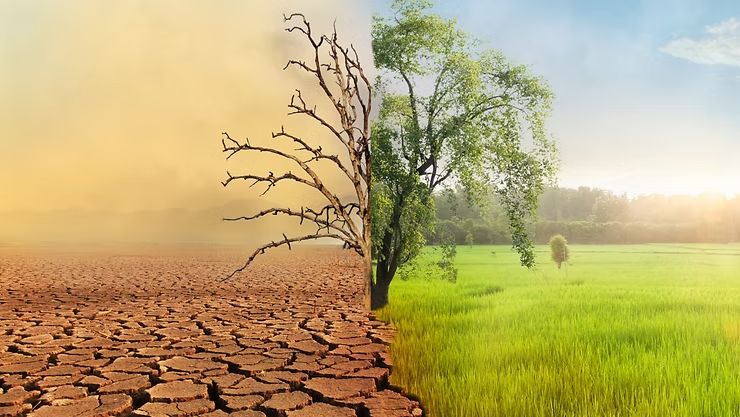Climate Change: Understanding the Global Crisis
Climate change, also known as global warming, is the most urgent environmental crisis facing humanity. It is primarily caused by greenhouse gas emissions from human activities such as burning fossil fuels, deforestation, and agriculture. These emissions increase global temperatures, melt sea ice, and disrupt weather patterns worldwide.
Key Takeaways
- Caused by greenhouse gas emissions from human activities.
- Leads to rising global temperatures and altered weather patterns.
- Impacts are felt worldwide, including in the Arctic and Antarctic regions.
- Individual and collective actions can help mitigate climate change.
- Adapting to a warmer world is crucial for the future.
Understanding the Basics
Climate change refers to long-term shifts in temperature, precipitation, and other weather patterns. The primary driver is human-induced greenhouse gas emissions, which trap heat in the Earth’s atmosphere.
- Burning fossil fuels, deforestation, and industrial processes accelerate climate change.
- Impacts include rising sea levels, extreme weather, and biodiversity loss.
- Mitigation requires reducing carbon footprints, transitioning to renewable energy, and adopting sustainable practices.
Causes and Effects
- Greenhouse gases: Trap heat and raise global temperatures.
- Human activities: Fossil fuel burning, deforestation, and agriculture increase greenhouse gas emissions.
- Environmental impacts: Melting ice caps, sea-level rise, extreme weather, ecosystem disruption.
- Social and economic effects: Community displacement, loss of livelihoods, increased poverty.
The Role of Human Activities
- Energy production, transportation, and industry are major contributors to greenhouse gas emissions.
- Deforestation and overfishing worsen environmental degradation.
- Human actions are the main cause of climate change—but also the key to solutions.
Global Warming: Exploring the Science
- Greenhouse effect: Naturally traps heat; intensified by human activities.
- Carbon dioxide emissions: Major contributor to rising temperatures.
- Feedback loops: Melting ice reduces reflectivity, accelerating warming.
- Scientific research supports the link between human activity and global warming.
Impacts on the Environment
- Threatens ecosystems, food security, and biodiversity.
- One million species at risk of extinction.
- Exacerbates inequalities—those most exploited often face the worst impacts.
- Alters land use, water availability, and ecosystem services.
Adapting to a Warmer World
- Stay informed on research and climate developments.
- Take daily actions to reduce carbon footprints.
- Support renewable energy and climate-friendly policies.
- Prepare for extreme weather and future climate impacts.
Individual Actions Matter
- Reduce, reuse, and recycle to conserve resources.
- Conserve energy and use efficient appliances.
- Choose sustainable transportation methods like walking, biking, or public transit.
- Support renewable energy initiatives like solar and wind power.
Mitigating Climate Change
- Reduce your carbon footprint through sustainable choices.
- Support renewable energy adoption and conservation practices.
- Recycle and compost to minimize waste.
- Every small action contributes to a global impact.
Preparing for the Future
- Adopt energy-efficient appliances and sustainable transportation.
- Support renewable energy projects.
- Embrace sustainable lifestyle practices to reduce environmental impact.
- Work collectively to mitigate climate change and ensure a livable planet.
Conclusion
Climate change is a pressing global crisis. Rising temperatures from greenhouse gas emissions are causing ice melt, extreme weather, and environmental disruption worldwide. Immediate action from individuals, industries, and governments is essential. Through sustainable practices, renewable energy adoption, and global cooperation like the Paris Climate Agreement, we can mitigate the impacts and ensure a healthier planet for future generations.
Frequently Asked Questions
- What is climate change? Long-term shifts in temperature and weather patterns caused by human activity.
- What is global warming? The rise in average air temperatures due to greenhouse gas accumulation.
- Causes? Fossil fuel burning, deforestation, and agriculture.
- Effects? Rising sea levels, extreme weather, biodiversity loss, and social-economic impacts.
- Environmental impact? Disrupted ecosystems, habitat loss, species extinction, altered resource availability.
- Individual mitigation? Reduce energy use, recycle, support renewable energy, adopt sustainable habits.
- Paris Climate Agreement? International treaty aiming to limit global warming to well below 2°C above pre-industrial levels.
- Carbon offsetting? Compensating emissions via projects like reforestation or renewable energy.

